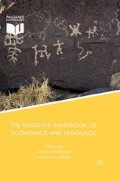Abstract
Ever since the 16th century when unified Russia emerged after a long period of feudal fragmentation the state played a key role in the development and standardization of the Russian language and in its spreading among various ethnic groups. Specific tasks and tools of state policy with regard to Russian and other languages varied greatly over time. Nevertheless, for centuries the major trend of Russia’s language policy was the standardization both in a narrow sense (aimed at reducing dialectical barriers among ethnic Russians through the development and promotion of a standardized version of Russian) and in a wider sense (aimed at the expansion of the use of Russian in public affairs along with or sometimes instead of other languages).
Access this chapter
Tax calculation will be finalised at checkout
Purchases are for personal use only
Preview
Unable to display preview. Download preview PDF.
References
B. Anderson and B. Silver (1984) ‘Equality, Efficiency, and Politics in Soviet Bilingual Education Policy, 1934–1980’, The American Political Science Review, 78, 1019–1039.
A. Arefyev (2012) Russkiy yazyk na rubezhe XX–XXI vekov [Elektronniy resurs] (Moscow: Tsentr sotsialnogo prognozirovaniya i marketinga), www.isras.ru/index.php?page_id=1330&id=2503¶m=http://www.isras.ru/files/File/Publication/russkij_yazyk.pdf, retrieved 22 August 2014.
I. Baldauf (2001) ‘Jadidism in Central Asia within Reformism and Modernism in the Muslim World’, Die Welt des Islams, New Series, 41, 72–88.
Y. Bilinsky (1981) ‘Expanding the Use of Russian or Russification? Some Critical Thoughts on Russian as a Lingua Franca and the “Language of Friendship and Cooperation of the Peoples of the USSR”’, Russian Review, 40, 317–332.
P. Blitstein (2006) ‘Cultural Diversity and the Interwar Conjuncture: Soviet Nationality Policy in Its Comparative Context’, Slavic Review, 65, 273–293.
M. Bruchis (1984) ‘The Language Policy of the CPSU and the Linguistic Situation in Soviet Moldavia’, Soviet Studies, 36, 108–126.
S. Corrsin (1990) ‘Language Use in Cultural and Political Change in Pre-1914 Warsaw: Poles, Jews, and Russification’, The Slavonic and East European Review, 68, 69–90.
J. Cracraft (2004) The Petrine Revolution in Russian Culture (Cambridge, MA: Belknap Press of Harvard University Press).
W. Dowler (1995) ‘The Politics of Language in Non-Russian Elementary Schools in the Eastern Empire, 1865–1914’, Russian Review, 54, 516–538.
V. Ginsburgh and S. Weber (2014) ‘Culture, Languages, and Economics’ In V. Ginsburgh and D. Throsby (eds) Handbook of the Economics of Art and Culture, vol. 2 (Amsterdam and New York: Elsevier), pp. 507–544.
C. Halperin (2007) ‘The Russian and Slavonic Languages in Sixteenth-Century Muscovy’, The Slavonic and East European Review, 85, 1–24.
E. Jones and F. Grupp (1984) ‘Modernisation and Ethnic Equalisation in the USSR’, Soviet Studies, 36, 159–184.
M. Kirkwood (1991) ‘Glasnost, “the National Question” and Soviet Language Policy’, Soviet Studies, 43, 61–81.
E. Koutaissoff (1951) ‘Literacy and the Place of Russian in the Non-Slav Republics of the USSR’, Soviet Studies, 3, 113–130.
D. Laitin (2000) ‘What Is a Language Community?’, American Journal of Political Science, 44, 142–155.
V. Lenin (1973 [1914]) ‘Nuzhen li obyazatelniy gosudarstvenniy yazyk?’ In K. Ostroukhova (ed.) Polnoye sobraniye sochineniy V.I. Lenina, vol. 24 (Moscow: Politizdat), 293–295.
V. Lenin (1899) Razvitiye Kapitalizma v Rossii (St. Petersburg: Izdaniye M.I. Vodovozovoy).
E. Lewis (1971) ‘Migration and Language in the USSR’, International Migration Review, 5, 147–179.
W. Matthews (1953) ‘The Russian Language before 1700’, The Slavonic and East European Review, 31, 364–387.
M. Okenfuss (1985) ‘From School Class to Social Caste: The Divisiveness of Early-Modern Russian Education’, Jahrbücher für Geschichte Osteuropas, Neue Folge, 33, 321–344.
N. Ostroumov (1910) ‘Kolebaniya vo vzglyadah na obrazovaniye tuzemtsev v Turkestanskom kraye’ In Kaufmanskiy sbornik (Moscow: Tipo-litografia T-va I.N. Kushnerev i Ko), pp. 139–160.
A. Pavlenko (2008) ‘Russian in Post-Soviet Countries’, Russian Linguistics, 32, 59–80.
D. Saprykin (2009) Obrazovatelniy potentsial Rossiyskoy Imperii (Moscow: IIET RAN).
J. Smith (1997) ‘The Education of National Minorities: The Early Soviet Experience’, The Slavonic and East European Review, 75, 281–307.
M. Smith (1998) Language and Power in the Creation of the USSR, 1917–1953 (Berlin: Mouton de Gruyter).
D. Staliūnas (2007) ‘Between Russification and Divide and Rule: Russian Nationality Policy in the Western Borderlands in mid-19th Century’, Jahrbücher für Geschichte Osteuropas, Neue Folge, 55, 357–373.
E. Thaden (ed.) (1981) Russification in the Baltic Provinces and Finland, 1855–1914 (Princeton: Princeton University Press).
L. Uspenskiy (1962) Slovo o slovah (Leningrad: Lenizdat).
T. Weeks (2004) ‘Russification: Word and Practice 1863–1914’, Proceedings of the American Philosophical Society, 148, 4471–489.
L. Yakubinskiy (1986) ‘Kratkiy ocherk zarozhdeniya i pervonachalnogo razvitiya russkogo natsionalnogo literaturnogo yazyka (XV–XVII veka)’ In L. Yakubinskiy (ed.) Izbrannye raboty. Yazyk i yego funktsionirovaniye (Moscow: Nauka), pp. 128–158.
Editor information
Editors and Affiliations
Copyright information
© 2016 Denis V. Kadochnikov
About this chapter
Cite this chapter
Kadochnikov, D.V. (2016). Languages, Regional Conflicts and Economic Development: Russia. In: Ginsburgh, V., Weber, S. (eds) The Palgrave Handbook of Economics and Language. Palgrave Macmillan, London. https://doi.org/10.1007/978-1-137-32505-1_20
Download citation
DOI: https://doi.org/10.1007/978-1-137-32505-1_20
Publisher Name: Palgrave Macmillan, London
Print ISBN: 978-1-349-67307-0
Online ISBN: 978-1-137-32505-1
eBook Packages: Literature, Cultural and Media StudiesLiterature, Cultural and Media Studies (R0)

